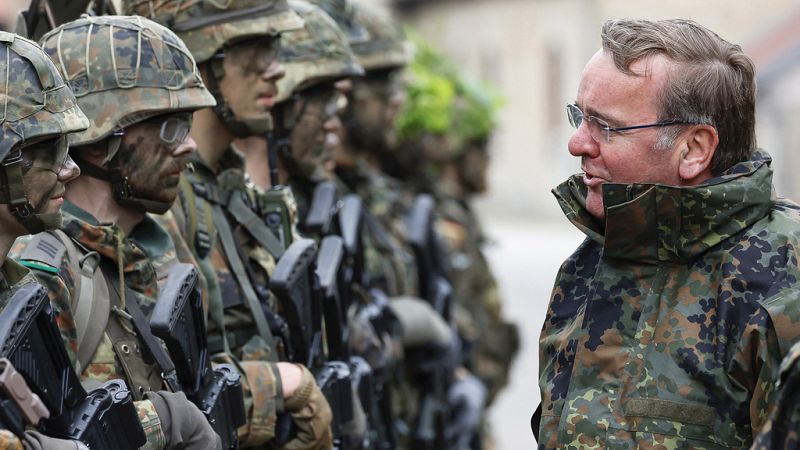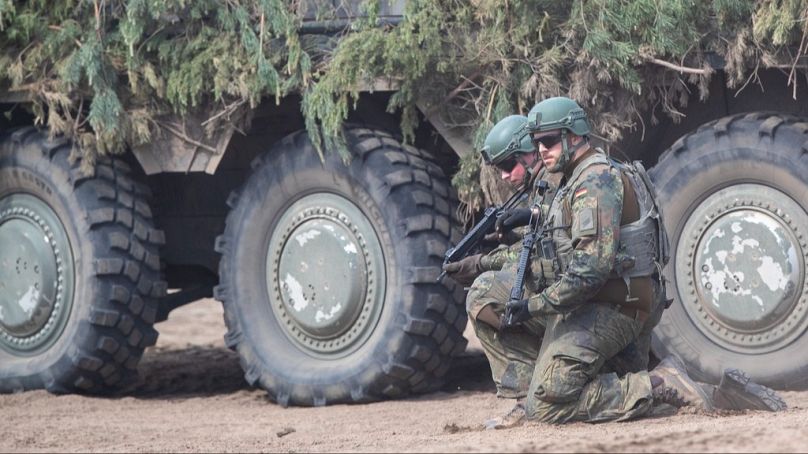German government accepts proposal to encourage voluntary military service

The German government has approved a bill proposing a new law aimed at promoting voluntary recruitment.
"A functioning Bundeswehr requires a functioning country," German Defence Minister Boris Pistorius said as he presented the Military Service Modernisation Act.
"A strong army - in terms of personnel and equipment - is the most effective means of preventing wars," Pistorious explained.
Ahead of Wednesday's cabinet meeting, Pistorius reiterated that the new military service would initially be voluntary.
Pistorius plans to increase the number of temporary and professional soldiers to at least 260,000 by 2035, and 460,000 including reservists.
According to the Ministry of Defence, the aim is to increase the personnel strength of the Bundeswehr in response to new threats.
The proposed law must now be passed by a majority in Parliament.
What does Pistorius' military service model look like?
From 2026, all young men and women will receive a questionnaire from the Bundeswehr that asks about their state of health, educational qualifications, and interest in serving.
Completion of the questionnaire will be mandatory for men and voluntary for women, in line with the German constitution.
The new model would initially be voluntary, with the Bundeswehr aiming to attract around 100,000 recruits by 2030. However, the bill would also allow the Bundestag to reintroduce compulsory military service with a simple amendment if not enough recruits enlist voluntarily.
All males born from 2008 onwards who were previously registered via the questionnaire would then be eligible for service.
Amid a debate on whether conscription should remain solely voluntary, the German chancellor said amendments are possible.
"If we realise that we need to make adjustments, we will do so. This is also already laid out in the law," said Federal Chancellor Friedrich Merz at today's press conference.
However, some from Merz's centre-right CDU party criticised the voluntary model.
You cannot defend yourself with questionnaires, the chairman of the defence committee Thomas Röwekamp from Merz's centre-right CDU party said.
Speaking to Redaktionsnetzwerk Deutschland (RND), CDU/CSU parliamentary group deputy Norbert Röttgen also doubted that Germany would be "capable of defence on the basis of this draft law."
According to Röttgen, there are "no figures or deadlines as to what is to be achieved and when, so that measures can be taken if the targets are missed."
'Focus on voluntary service'
The centre-left SPD's youth group (Juso) leader Philipp Türmer criticised the mechanism that could make service mandatory in an interview with German broadcaster NTV. He reiterated that his party "are against compulsory elements".
"We are also against options in the law that can be activated to reintroduce compulsory service. We need a clear decision now, and this decision must be that we are in favour of voluntary service," said Türmer.
The president of the Reservists' Association, Patrick Sensburg, stated that Pistorius' model is a significant step in the right direction.
"Nevertheless, this voluntary military service will not be enough to ensure that we have enough reservists to cope with the security policy tasks of our time," Sensburg explained.
The reservists' association has been calling for the reintroduction of compulsory military service since 2015, he pointed out.
"Because only compulsory military service will ensure that we recruit enough reservists for the coming years to ensure the ability of our armed forces to grow and thus increase our country's deterrent capability," Sensburg told Euronews.
Drone training, subsidised driving licences and sports clubs
With the new military service, the German government initially wants to recruit young people to serve voluntarily and offer them a wide range of training programmes.
From the summer, recruits would begin with security and guard duties, gaining practical experience in various areas of the Bundeswehr and receiving further training, such as handling drones, language courses and financial support for their driving licence.
During a visit to the troops, Pistorius emphasised that the training would be top-tier and that the participants should be proud of their achievements and the camaraderie they experience.
At the same time, he said service for one's country should be seen as something special and the training should be meaningful.
Today


